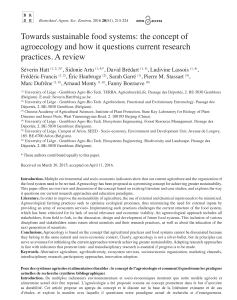 Hatt S., Artru S., Brédart D., Lassois L., Francis F., Haubruge E., Garré S., Stassart P., Dufrêne M., Monty A., Boeraeve F.
Hatt S., Artru S., Brédart D., Lassois L., Francis F., Haubruge E., Garré S., Stassart P., Dufrêne M., Monty A., Boeraeve F.
Introduction. Multiple environmental and socio-economic indicators show that our current agriculture and the organization of the food system need to be revised. Agroecology has been proposed as a promising concept for achieving greater sustainability. This paper offers an overview and discussion of the concept based on existing literature and case studies, and explores the way it questions our current research approaches and education paradigms.
Literature. In order to improve the sustainability of agriculture, the use of external and chemical inputs needs to be minimized. Agroecological farming practices seek to optimize ecological processes, thus minimizing the need for external inputs by providing an array of ecosystem services. Implementing such practices challenges the current structure of the food system, which has been criticized for its lack of social relevance and economic viability. An agroecological approach includes all stakeholders, from field to fork, in the discussion, design and development of future food systems. This inclusion of various disciplines and stakeholders raises issues about scientists and their research practices, as well as about the education of the next generation of scientists.
Conclusions. Agroecology is based on the concept that agricultural practices and food systems cannot be dissociated because they belong to the same natural and socio-economic context. Clearly, agroecology is not a silver-bullet, but its principles can serve as avenues for rethinking the current approaches towards achieving greater sustainability. Adapting research approaches in line with indicators that promote inter- and transdisciplinary research is essential if progress is to be made.
Consultez la notice complète de l’article sur ORBi
